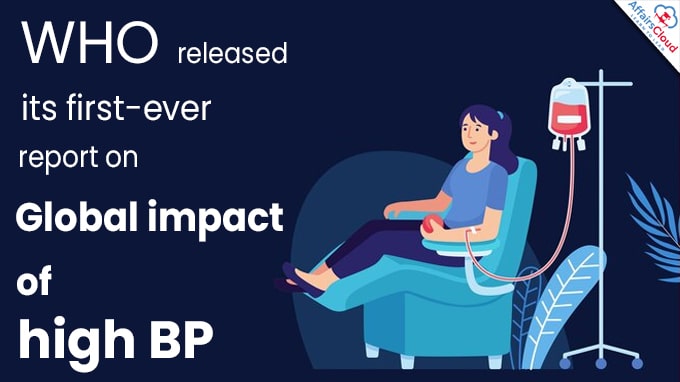
- Hypertension, also known as high or raised blood pressure, is a condition in which the blood vessels have persistently raised pressure.
- This comprehensive report features statistics underscoring the consequences of uncontrolled hypertension, ranging from heart attacks, strokes, and premature death to substantial economic loss.
Key Points:
i.The report reveals that approximately 4 out of every 5 people with hypertension are not receiving adequate treatment. By scaling up coverage, it’s estimated that 76 million deaths could be prevented between 2023 and 2050.
ii.The world is not on track to meet the voluntary global target of a 25% reduction in the prevalence of raised blood pressure (uncontrolled hypertension) by 2025.
Who-recommended Components for Hypertension Care:
The report underscores the importance of implementing WHO-recommended effective hypertension care to save lives, which includes the following 5 components:
- Protocol
- Medication and equipment supply
- Team-based care
- Patient-centered services
- Information systems
Analysis of the Report:
Rising numbers:
i.Between 1990 and 2019, the number of individuals living with hypertension (BP of 140/90 mmHg or higher or taking medication for hypertension), doubled from 650 million to 1.3 billion.
ii.Nearly 50% of those people with hypertension remain unaware of their condition. This lack of awareness is a critical hurdle in addressing the issue.
- More than three-quarters of adults with hypertension live in low- and middle-income countries (LMICs).
Preventive measures:
i.The prevention, early detection, and effective management of hypertension, according to WHO, are among the most cost-effective interventions in health care.
- It should be prioritized by countries as part of their national health benefit package offered at a primary care level.
ii.WHO noted that more than 40 LMICS, including Bangladesh, Cuba, India, and Sri Lanka, have strengthened their hypertension care with the HEARTS package, enrolling more than 17 million people into treatment programs.
iii.The economic benefits of improved hypertension treatment programs outweigh the costs by about 18 to 1.
Note: The HEARTS technical package provides a strategic approach to improving cardiovascular health in countries. It comprises six modules and an implementation guide.
Overview of India & Hypertension:
According to the report, around 4.6 million deaths in India can be prevented by 2040 if around 50% of its hypertensive population controls its blood pressure.
- The report shows an estimated 188.3 million adults aged 30-79 years live with hypertension in India. In order to achieve a 50% control rate, 67 million more people with hypertension would need to be effectively treated.
- Only 37% of Indians with hypertension are diagnosed and only 30% get treated. At present, only 15% of those with hypertension in India have it under control.
Key Points:
i.The report takes a look at the India Hypertension Control Initiative (IHCI), a collaborative initiative of the Ministry of Health and Family Welfare(MoH&FW), state governments, Indian Council of Medical Research (ICMR), WHO-India and Resolve to Save Lives as a technical partner.
- The IHCI was started in 2018 to improve hypertension control in the community using the WHO HEARTS strategy of the evidence-based treatment protocol, and uninterrupted drug supply, among others.
iii.IHCI launched in selected districts of 5 states and, as of June 2023, had scaled up to 155 districts of 27 states with the enrolment of 5.8 million hypertension patients.
Recent related News:
The latest update of the Global Multidimensional Poverty Index (MPI) was released by the United Nations Development Programme (UNDP) and the Oxford Poverty and Human Development Initiative (OPHI) at the University of Oxford, United Kingdom(UK).
About World Health Organisation (WHO):
Director-General- Dr Tedros Adhanom Ghebreyesus
Headquarters- Geneva, Switzerland
Established on- 7 April 1948